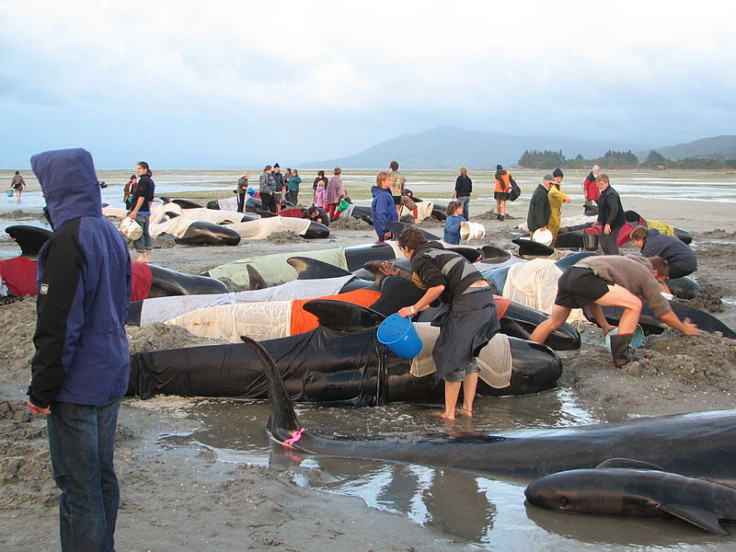Pilot Whales Stranded In Remote Florida Everglades, Scientists ‘May Not Be Able’ To Save Them

Marine wildlife experts are scratching their heads over what to do about a pod of 20 to 30 pilot whales that stranded themselves in a remote area of Florida’s Everglades National Park. According to The Associated Press, volunteers watched over the whales on Wednesday, making sure they stayed wet during low tide.
The short-finned pilot whales, normally found in the deep waters of the Gulf of Mexico where they munch on squid, are all between 12 and 18 feet in length. According to NBC Miami, the whales swam into shallow waters Tuesday afternoon and appeared confused, scientists said.
A ranger for the Everglades National Park, located on the southernmost tip of Florida, said she received a phone call Tuesday about four whales that had come ashore. When investigators went out, they spotted 10 beached whales in total. According to NBC Miami, volunteers where able to save five of them, but the others died. Because the water is so shallow for such a long stretch, it’s hard to get the whales out to where they can swim.
What caused the pilot whales to beach themselves in the first place? The Palm Beach Post reported that the so-called whales, which are actually closer to dolphins, travel in tight-knit groups and will follow a single member if it happens to venture into shallow waters. Scientists believe the whale that led the group into the remote area of the Florida Everglades may have been sick or hungry.
“This species is very cohesive, so if there is one that is sick, the others will follow it to shore. Even when one is dead on shore, the others will stay there,” Blair Mase, Marine Mammal Stranding Network Coordinator for the National Oceanic and Atmospheric Administration, told the Palm Beach Post. “It’s very remote, the most western boundary of the Everglades National Park.”
Rescue workers are having a difficult time getting the whales back out to sea partly because of how out-off-the-grid the area is. Reaching the whales requires wading through about 200 yards of shallow water and, according to the Palm Beach Post, crews can’t even get cell service where they are working.
Pilot whales are the most common type of whale to get stranded. The reason for these mass strandings is still something of an enigma, according to the NOAA. Mass beachings of pilot whales occur throughout the world, including New Zealand and South Africa.
In January 2005, 27 pilot whales stranded themselves on the shores of North Carolina. Researchers performed necropsies on the beached whales, but failed to find a “single cause” for the stranding event.
“Overall, the cause of [the stranding] in North Carolina is not and likely will not be definitively known,” NOAA concluded.
© Copyright IBTimes 2025. All rights reserved.






















